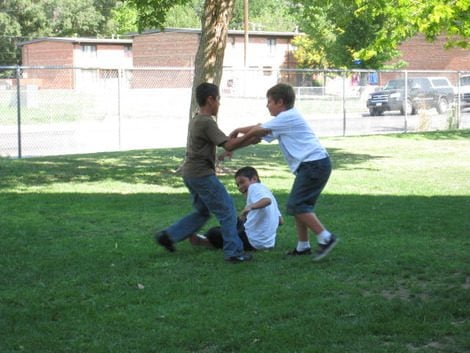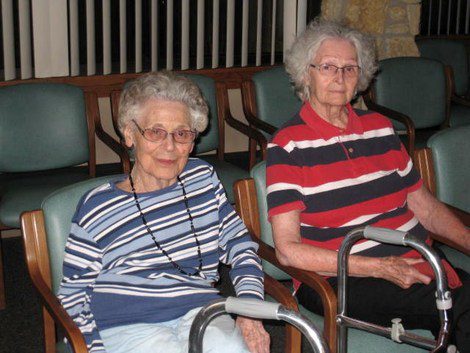Mothers are very special, so in honor of mothers everywhere, here is what the Bible says about you.
Honoring Mom
The Bible doesn’t just teach that we should honor others, like the elders among us, but also to honor our father and our mother. That is the first horizontal commandment given which relates to how we deal with one another. The fifth commandment says, “Honor your father and your mother, that your days may be long in the land that the Lord your God is giving you” (Ex 20:12). That doesn’t say to honor those parents who are worthy to be honored, but to honor your father and your mother. This commandment has a promise. If a person honors their father and mother, then their “days may be long in the land.” That sounds very much like a blessing for honoring your parents. Of course some find it impossible to honor their parents if they’ve been abused. How can you honor someone that did “that” to you!? Only they can answer that question, but God does expect us to give to others, not what they deserve, but what they need. Jesus says to “Love your enemies, do good to those who hate you, bless those who curse you, pray for those who abuse you” (Luke 6:27-28). So we can pray for our enemies, but not our parents because they did such and such to us!? Remember what God did to us in that “Christ died for the ungodly” (Rom 5:6), and so “God shows his love for us in that while we were still sinners, Christ died for us” (Rom 5:8). God did not give us what we deserved (Rom 3:23) but what we needed (Eph 2:8-9), so even “while we were enemies we were reconciled to God by the death of his Son, much more, now that we are reconciled, shall we be saved by his life” (Rom 5:10), therefore, we give our parents what they need, and not necessarily what they deserve.
Honor in Deed
I believe honoring your father and your mother includes your father-in-law and mother-in-law. Ruth so honored her mother-in-law by telling her, “Do not urge me to leave you or to return from following you. For where you go I will go, and where you lodge I will lodge. Your people shall be my people, and your God my God. Where you die I will die, and there will I be buried. May the LORD do so to me and more also if anything but death parts me from you” (Ruth 1:16-17). Ruth was willing to give up her old life to ensure her mother-in-law would be taken care of, and went to a land and people that were not her land and people. She was faithful to her mother-in-law, and honored her in deed, not just in word. My mother-in-law is easy to honor because she’s such an honorable woman. I must have the kindest, most gentle mother-in-law in human history because she’s such a good and godly woman, so I treat her with respect and honor. I realize that a lot of people are not so blessed.
Taught and Caught
I’ve heard that more is caught than taught, but don’t let us neglect the teaching part because it’s essential to the child’s wellbeing. Solomon himself was taught by his mother (Prov 31:1) and wrote, “Hear, my son, your father’s instruction, and forsake not your mother’s teaching” (Prov 1:8). Most of us, or at least many of us, can honestly say their mothers were “like a nursing mother taking care of her own children” (1 Thess 2:7), which was just how the Apostle Paul treated the church at Thessalonica. Is it any wonder that God uses the image of the comfort a mother gives her child as the care LinkHe has for His own? The Psalmist wrote, “But I have calmed and quieted my soul, like a weaned child with its mother; like a weaned child is my soul within me” (Psalm 131:2). Timothy was obviously influenced by his mother and grandmother, as Paul says he was “reminded of your sincere faith, a faith that dwelt first in your grandmother Lois and your mother Eunice and now, I am sure, dwells in you as well” (2 Tim 1:5). We would all do well to “Keep your father’s commandment, and forsake not your mother’s teaching” (Prov 6:20).
Honor by Sacrifice
 As Jesus was dying on the cross, He gave a command to the Apostle John to take care of His mother. It says, “When Jesus saw his mother and the disciple whom he loved standing nearby, he said to his mother, “Woman, behold, your son!” Then he said to the disciple, “Behold, your mother!” And from that hour the disciple took her to his own home” (John 19:26-27). Even in His agonizing moments on the cross, Jesus was thinking of His mother. He honored His mother by ensuring she’d be taken care of after His death on the cross. John didn’t hesitate, and so he also honored Jesus’ mother. Part of honoring your mother and honoring your parents is doing for them what they might not be able to do for themselves. Maybe it’s doing something to make their lives a little bit easier. Our mothers have sacrificed so much time and effort for us, how can we not honor them, even if they’re not with us anymore. You can honor them by speaking about the good they did. You can honor them by remember the positive things they’ve done and the positive influence they’ve left on you. Honoring parents goes well beyond leaving flowers at their grave. God never placed a time limit placed on the fifth commandment, and there is no disclaimer to where if the parents are deemed unworthy, then they don’t need to be honored. We ought to praise God and thank God for our parents and our children, for “He gives the barren woman a home, making her the joyous mother of children. Praise the Lord” (Psalm 113:9)!
As Jesus was dying on the cross, He gave a command to the Apostle John to take care of His mother. It says, “When Jesus saw his mother and the disciple whom he loved standing nearby, he said to his mother, “Woman, behold, your son!” Then he said to the disciple, “Behold, your mother!” And from that hour the disciple took her to his own home” (John 19:26-27). Even in His agonizing moments on the cross, Jesus was thinking of His mother. He honored His mother by ensuring she’d be taken care of after His death on the cross. John didn’t hesitate, and so he also honored Jesus’ mother. Part of honoring your mother and honoring your parents is doing for them what they might not be able to do for themselves. Maybe it’s doing something to make their lives a little bit easier. Our mothers have sacrificed so much time and effort for us, how can we not honor them, even if they’re not with us anymore. You can honor them by speaking about the good they did. You can honor them by remember the positive things they’ve done and the positive influence they’ve left on you. Honoring parents goes well beyond leaving flowers at their grave. God never placed a time limit placed on the fifth commandment, and there is no disclaimer to where if the parents are deemed unworthy, then they don’t need to be honored. We ought to praise God and thank God for our parents and our children, for “He gives the barren woman a home, making her the joyous mother of children. Praise the Lord” (Psalm 113:9)!
Conclusion
Mothers intuitively know to “Train up a child in the way he should go; even when he is old he will not depart from it” (Prov 22:6). It is in their nature. Mothers are a child’s first and best teacher, only having the best interests of the child in mind, motivated by their unconditional love for their child. I believe the commandment to honor your parents includes the father-in-law and mother-in-law, but also grandparents, as they are also parents. If you liked this article about mothers, please share this with someone, or bookmark it for Mother’s Day.
Article by Jack Wellman
Jack Wellman is Pastor of the Mulvane Brethren Church in Mulvane Kansas. Jack is a writer at Christian Quotes and also the Senior Writer at What Christians Want To Know whose mission is to equip, encourage, and energize Christians and to address questions about the believer’s daily walk with God and the Bible. You can follow Jack on Google Plus or check out his book Teaching Children the Gospel available on Amazon.











